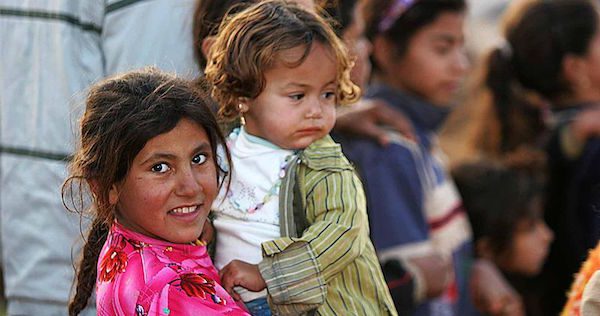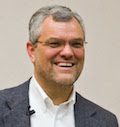
Editors’ Note: This article is part of the Patheos Public Square on Immigration and Refugees. Read other perspectives here.
By Dale McGowan
Founding executive director, Foundation Beyond Belief
In the summer of 2013, I spent a lot of time imagining that I had lost everything—and it didn’t take much imagination.
It started with the F-5 tornado in Moore, Oklahoma. A young woman holding her toddler in front of the ruins of her home made me feel, viscerally, what it would be like to endure both the disaster itself and the disastrous aftermath.
Three weeks after the tornado, I was speaking in Oklahoma City and met that young woman. Her name was Rebecca Vitsmun. Like me, Rebecca was an atheist and a humanist, a fact she had to reveal unexpectedly on national television when Wolf Blitzer asked, with strange presumption, if she thanked the Lord for her survival.
That we shared a worldview had nothing to do with my empathy, though our shared identity as parents may well have. The moment I saw her holding that boy in front of the flatten house they had both been in, I felt it in my gut.
Fortunately, a humanist charitable foundation I led at the time called Foundation Beyond Belief gave the nonreligious community an effective outlet for our compassion. We mounted a drive that quickly raised over $50,000 to provide food aid and material relief for the tornado survivors.
Three months later, our staff became aware of the extent of the unfolding tragedy in and around Syria as two million refugees fled the Syrian civil war. International aid was falling desperately short of the need. Commentators drew unflattering comparisons between the crisis and other disasters that had drawn a more effective global response.
The problem was emotional and psychological: Donors respond most strongly to disasters that are sudden and visual and events in which they can directly relate to the victims. Terrorist attacks, earthquakes, and tsunamis all reach us visually and viscerally. A refugee crisis is more diffuse, slower moving – and more foreign to our imaginations. It is easy to understand the pain of displacement, but harder to really feel it.
In my mind, it was a perfect opportunity to rally the secular humanist community. Two values that animate humanists above all others are the value of rational responses over emotional ones, and the rejection of every form of tribalism. For many nonreligious people, both of these values represent a decisive step away from the most problematic aspects of religious community. They are especially keenly felt by those who were once religious, especially in conservative or dogmatic denominations.
The potential for human suffering in the refugee crisis was far greater in extent than any natural disaster in recent memory. That this potential had not yet manifested fully was an opportunity to get ahead of the curve. The fact that a “tribe” far from our own was doing the suffering was an opportunity to demonstrate our intention to be “citizens of the world.” And the fact that the world at large was failing to come through represented a chance to demonstrate our particular strengths as a movement.
So Foundation Beyond Belief mounted another fund drive to support the Syrian refugees. We selected International Rescue Committee (the IRC) as our beneficiary and provided our community with the facts and figures they needed to make a rational decision as donors.
And donations…trickled in.
It’s not that our donors lacked compassion. Far from it. The fairly small community of atheists and humanists had just poured their hearts into a large, successful drive just weeks earlier after the Oklahoma tornado. As a result, donor fatigue was a real factor. But I suspected that something else might be in play as well, something entirely understandable and very human—something to which atheists and humanists often think themselves immune.
Every community that articulates binding values is at risk of confusing the statement of those values with their achievement. Most atheists can rattle off a litany of those self-delusions for any given religious community. But we’re not as adept at seeing how we’ve mythologized ourselves.
Among our own delusions is the conviction that, by exiting religion under our own power, we had achieved pure rationality and freedom from tribalism. But seceding from our own human inheritance by fiat is easier said than done. My own daily life provides enough evidence to remind me that I’m neither fully rational nor fully free of chauvinistic loyalties.
To more effectively reach our donors, we added personal stories to the numbers, using the videos and written storytelling of the IRC to share the lives and experiences of individual refugee families. The data was still there – 2 million people externally displaced, 4.5 million internally displaced, an inadequate international response, 3,500 unaccompanied children crossing national borders, 35% of Syrian hospitals non-functional – but by adding this storytelling, we added opportunities for direct empathy. We provided a human face of this more distant and diffuse tragedy so donors could feel what they felt when they saw Rebecca standing in the ruins of her American home.
After we provided that human face, donations surged.
The following year, we launched a similar drive in the atheist and humanist community in support of unaccompanied minors who were arriving as refugees at the southern U.S. border. This time we struck a more effective balance from the start, bringing both reason and emotion to the effort.
But what about tribalism? Neither of these drives approached the level of support for the victims in Oklahoma—and I’m not convinced it was all fatigue. If the order of the drives had switched, I suspect Oklahoma would still have drawn a stronger response than Syria, not because our donors are humanists, but because they are humans. No matter how much we yearn to break free of our parochialism, our compassion is naturally strongest for sufferings we can relate to, and for people whose lives and situations are most like ours. It’s the same reason a massacre in France brings out a greater outpouring of grief and emotion from the West than even a much larger massacre in Baghdad or Nigeria.
Like many of our human inheritances, this is not a good thing, but it is a natural one—a product of evolution that leads us to protect and defend those who are closest to us and to over-emphasize that which divides us from “the other.”
Progressive religious communities are at their best when they urge their adherents to see themselves in the other, to recognize and transcend the concentric circles of diminishing empathy that emanate outward from us. And one of the reasons I’m proud to be a humanist is that humanism continues to articulate that urgent need, even as we struggle no less than the religious to achieve it.
Postscript: In a nice poetic circle, Rebecca Vitsmun, the atheist and humanist in Oklahoma who inspired so much compassion from our community, is now Development Coordinator for the Humanist Disaster Recovery Teams program of Foundation Beyond Belief.
This article is part of the August feature on Immigration, Refugees, Welcoming (or Rejecting) the “Other” for Patheos Public Square.
 Dale McGowan is the author and editor of 10 books about the nonreligious life. He was founding executive director of Foundation Beyond Belief, the world’s largest humanist charity, from 2009 to 2015. He is currently Director of Engagement and Managing Editor of the Atheist Channel at Patheos. He lives in Atlanta.
Dale McGowan is the author and editor of 10 books about the nonreligious life. He was founding executive director of Foundation Beyond Belief, the world’s largest humanist charity, from 2009 to 2015. He is currently Director of Engagement and Managing Editor of the Atheist Channel at Patheos. He lives in Atlanta.
Top image by James Gordon – Iraqi refugee children, Damascus, Syria, CC BY 2.0














